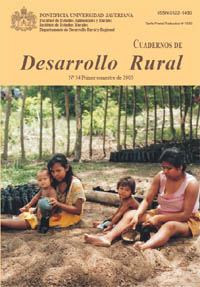Abstract
O objetivo do presente artigo é discutir os principais fatores operacionais einstitucionais que dificultam o acesso dos agricultores familiares ao crédito ruraldo Programa Nacional de Fortalecimento da Agricultura Familiar (PRONAF) naregião Nordeste do Brasil. Para tanto, foi realizada uma pesquisa empírica nomunicípio de São Miguel/RN. Verifica-se que o PRONAF apresenta um caráterseletivo e excludente, calcado em uma lógica produtivista, que idealiza um “tipoideal” de agricultor familiar a ser incentivado no país, excluindo todos os demaisprodutores “incapazes” de se enquadrarem em seus preceitos. Este trabalhoconclui que a aplicação indiscriminada dos critérios nacionais do Programa, emparceria com a atuação insuficiente e “descoordenada” dos atores sociaisencarregados de realizar sua implantação e operacionalização no âmbito local(sindicato de trabalhadores rurais, órgão de extensão rural e agente financeiro),são os principais elementos responsáveis pelo desempenho sofrível dessa políticapública no município pesquisado. Sendo assim, caso esses obstáculos não sejamremovidos, a tendência é que esta situação perpetue-se ao longo dos anos.Cuadernos de Desarrollo Ruralis registered under a Creative Commons Attribution 4.0 International Public License. Thus, this work may be reproduced, distributed, and publicly shared in digital format, as long as the names of the authors and Pontificia Universidad Javeriana are acknowledged. Others are allowed to quote, adapt, transform, auto-archive, republish, and create based on this material, for any purpose (even commercial ones), provided the authorship is duly acknowledged, a link to the original work is provided, and it is specified if changes have been made. Pontificia Universidad Javeriana does not hold the rights of published works and the authors are solely responsible for the contents of their works; they keep the moral, intellectual, privacy, and publicity rights.
Approving the intervention of the work (review, copy-editing, translation, layout) and the following outreach, are granted through an use license and not through an assignment of rights. This means the journal and Pontificia Universidad Javeriana cannot be held responsible for any ethical malpractice by the authors. As a consequence of the protection granted by the use license, the journal is not required to publish recantations or modify information already published, unless the errata stems from the editorial management process. Publishing contents in this journal does not generate royalties for contributors.


